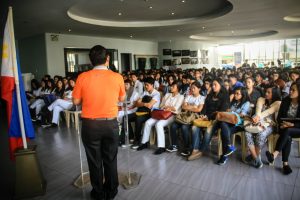The seminar on Ethics in Doing Research is the first of the four series of seminars on researches for students and research teachers this semester. The seminar was held on August 6, 2016 at the Centennial Hall of the University of Baguio. It was impressively attended by 233 students from the Graduate School, School of Allied Medical Sciences, School of Business Administration and Accountancy, School of Criminal Justice and Public Safety, School of Engineering and Architecture, School of International Hospitality and Tourism Management, School of Liberal Arts and Human Sciences, School of Dentistry and School of Teacher Education. There were 9 faculty members and 9 visitors who attended the seminar as well.
students and research teachers this semester. The seminar was held on August 6, 2016 at the Centennial Hall of the University of Baguio. It was impressively attended by 233 students from the Graduate School, School of Allied Medical Sciences, School of Business Administration and Accountancy, School of Criminal Justice and Public Safety, School of Engineering and Architecture, School of International Hospitality and Tourism Management, School of Liberal Arts and Human Sciences, School of Dentistry and School of Teacher Education. There were 9 faculty members and 9 visitors who attended the seminar as well.
To start, Dr. Lloyd Orduña expressed that the opinions disclosed in his presentation are solely his and not endorsed by UB-RDC. He opened his presentation with the definition of ethics, ethical norms, and the development of ethical codes of conduct. Ethical issues such as justification for the research, access to participants, informed consent and the potential of a research that may affect were primarily discussed by the speaker.
Another interesting part of the lecture was the ethical problems that may arise while conducting the research. It entails that the requirements of effective research sometimes is in conflict with the simple fulfillment of the obligation to obtain informed consent. Ethical ways for research design was also discussed. It is ethical behavior for a researcher to use resources efficiently and effectively, to work hard and to ensure the well-being of all colleagues and participants.
The Mertorniam Norms of communalism, universalism, disinterestedness, originality and skepticism were dichotomized and explained fully. The unethical ways for maximizing the research for publication was also discussed. Different unethical ways of making the most of the research to be published were enumerated such as salami-slicing or breaking up work into large number of small papers, tiling or publishing sequence of substantially overlapping papers and finally double-publishing or having the research be published twice.
Finally, a reminder was given for everyone with regards to the concern on plagiarism. Plagiarism is dishonesty. The research may be excellent but it wasn’t done by the author of the paper. Big cases of plagiarism also were incurred with the use of unpublished theses. It is difficult to detect unless the editor or the referee is familiar with the unpublished work in subject as well as the published work.
To end up the seminar, Dr. Orduña gave a general summary of some ethical principles that various codes address. To enumerate the principles are as follows:
- Honesty-honestly report data results, methods and procedures, and publication status. Do not fabricate, falsify, or misrepresent data. Do not deceive colleagues, research sponsors, or the public.
- Objectivity- strive to avoid bias, disclose personal or financial interests that may affect the research.
- Integrity- act with sincerity, strive for consistency of thought and action
- Carefulness- carefully and critically examine your own work and the work of your peers. Keep a good record of research activities such as data collection, research design, and correspondence with agencies or journals.
- Openness- share data, results, ideas, tools and resources.
- Respect for Intellectual Property- give proper acknowledgement or credit for all contributions to research. Do not plagiarize.
- Confidentiality- protect confidential information such as papers or grants submitted for publication, personal records, trade or military secrets, and patient records.
- Responsible Publication- publish in order to advance research and scholarship. Avoid wasteful and duplicative publication
- Responsible Mentoring- help to educate, mentor and advise and to promote welfare.
- Respect for colleagues- respect and treat your colleagues with fairness
- Social Responsibility- strive to promote social good and prevent or mitigate social harms through research, public education and advocacy.
- Non-Discrimination- avoid discrimination on the basis of sex, race, ethnicity, or other factors not related to scientific competence and integrity.
- Legality- recognize and obey relevant laws and institutional and governmental policies.
- Animal Care-give proper respect and care for animals when using them in research. Avoid unnecessary or poorly designed animal experiments.
- Human Subjects Protection- minimize harms and risks and maximize benefits, respect human dignity,privacy and autonomy; take special precautions with vulnerable populations; and strive to distribute the benefits and burdens of research fairly.
- Competence- maintain and improve your own professional competence and expertise through lifelong education and learning; take steps to promote competence in science and arts as a whole. – Eden Vidal-UB RDC
